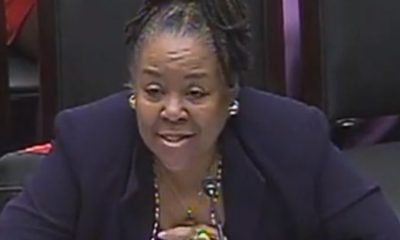Activism
COMMENTARY: Critical Race Theory: An Academic Concept, Not a Threat to Children
CRT has become a catch-all for all topics regarding race, inequality, White privilege, and oppression. Opposition to the law graduate theory has been distorted into a movement that created outrage and evolved into attempts to justify banning books about anti-racism in K-12 schools. This movement began with one right-wing PR person who spread misinformation through outlets like Fox News and galvanized White parents to protest.

By Daisha Williams, The Oakland Post
Since late 2020, Critical Race Theory (CRT) has been at the center of furious controversies. Despite all the heated arguments, many people still do not understand what Critical Race Theory is.
Sometimes, viewing it as part of vast conspiracy, right wing politicians and parents have often claimed CRT teaches children to hate White people.
Today, CRT is still an important topic of discussion. The theory was brought up in Supreme Court nominee Ketanji Brown Jackson’s Senate confirmation hearings when Republican senators attempted to discredit Jackson claiming she was a proponent of CRT being taught in K-12 schools.
Critical Race Theory was first developed in the 1970s and ’80s, soon after the Civil Rights Movement. The phrase was coined by Kimberlé Williams Crenshaw, an activist and professor at UCLA Law and Columbia Law school. As an academic and legal framework, CRT was intended for graduate students. The subject is more multifaceted than most in the media have made it out to be and is far too complex to be taught in K-12 schools.
A major aspect of CRT is that it rejects the idea of “color-blindness,” acknowledging that racism is more than individual prejudice and is instead systemic. CRT teaches that racism is something deeply embedded in the United States legal system due to centuries of race-based oppression. According to the New York Times, Crenshaw said, “[CRT] is a way of seeing, attending to, accounting for, tracing and analyzing the ways that race is produced, the ways that racial inequality is facilitated, and the ways that our history has created these inequalities that now can be almost effortlessly reproduced unless we attend to the existence of these inequalities.”
CRT has become a catch-all for all topics regarding race, inequality, White privilege, and oppression. Opposition to the law graduate theory has been distorted into a movement that created outrage and evolved into attempts to justify banning books about anti-racism in K-12 schools. This movement began with one right-wing PR person who spread misinformation through outlets like Fox News and galvanized White parents to protest.
Many parents reacted similarly to one parent who wrote an essay about an all-girls private school named Brearley, which had created discussions surrounding anti-racism. In the essay the parent wrote, “Brearley, by adopting critical race theory, is advocating the abhorrent viewpoint that Blacks should forever be regarded as helpless victims, and are incapable of success regardless of their skills, talents, or hard work. What Brearley is teaching our children is precisely the true and correct definition of racism.”
Brearley, and other schools in this country are not adopting CRT in their curriculums. They are bringing conversations about race into the classroom, straying away from White-washed versions of history that has neglected true American history for decades. Unfortunately, to people who aren’t educated on these matters, the Brearly parent’s arguments and fears seem justified. Many of the “concerned parents” that were featured on Fox News were people manipulating the facts for their own political agendas.
Grievances like these were dramatized by Fox News and are magnified through social media until they became a part of mainstream media.
Activism
Oakland Post: Week of April 24 – 30, 2024
The printed Weekly Edition of the Oakland Post: Week of April 24 – 30, 2024

To enlarge your view of this issue, use the slider, magnifying glass icon or full page icon in the lower right corner of the browser window. ![]()
Activism
Oakland Post: Week of April 17 – 23, 2024
The printed Weekly Edition of the Oakland Post: Week of April 17 – 23, 2024

To enlarge your view of this issue, use the slider, magnifying glass icon or full page icon in the lower right corner of the browser window. ![]()
Activism
Oakland Schools Honor Fred Korematsu Day of Civil Liberties
Every Jan. 30, OUSD commemorates the legacy of Fred Korematsu, an Oakland native, a Castlemont High School graduate, and a national symbol of resistance, resilience, and justice. His defiant stand against racial injustice and his unwavering commitment to civil rights continue to inspire the local community and the nation. Tuesday was “Fred Korematsu Day of Civil Liberties and the Constitution” in the state of California and a growing number of states across the country.

By Post Staff
Every Jan. 30, OUSD commemorates the legacy of Fred Korematsu, an Oakland native, a Castlemont High School graduate, and a national symbol of resistance, resilience, and justice.
His defiant stand against racial injustice and his unwavering commitment to civil rights continue to inspire the local community and the nation. Tuesday was “Fred Korematsu Day of Civil Liberties and the Constitution” in the state of California and a growing number of states across the country.
One OUSD school is named in his honor: Fred T. Korematsu Discovery Academy (KDA) elementary in East Oakland.
Several years ago, founding KDA Principal Charles Wilson, in a video interview with anti-hate organization “Not In Our Town,” said, “We chose the name Fred Korematsu because we really felt like the attributes that he showed in his work are things that the children need to learn … that common people can stand up and make differences in a large number of people’s lives.”
Fred Korematsu was born in Oakland on Jan. 30, 1919. His parents ran a floral nursery business, and his upbringing in Oakland shaped his worldview. His belief in the importance of standing up for your rights and the rights of others, regardless of race or background, was the foundation for his activism against racial prejudice and for the rights of Japanese Americans during World War II.
At the start of the war, Korematsu was turned away from enlisting in the National Guard and the Coast Guard because of his race. He trained as a welder, working at the docks in Oakland, but was fired after the bombing of Pearl Harbor in 1941. Fear and prejudice led to federal Executive Order 9066, which forced more than 120,000 Japanese Americans out of their homes and neighborhoods and into remote internment camps.
The 23-year-old Korematsu resisted the order. He underwent cosmetic surgery and assumed a false identity, choosing freedom over unjust imprisonment. His later arrest and conviction sparked a legal battle that would challenge the foundation of civil liberties in America.
Korematsu’s fight culminated in the Supreme Court’s initial ruling against him in 1944. He spent years in a Utah internment camp with his family, followed by time living in Salt Lake City where he was dogged by racism.
In 1976, President Gerald Ford overturned Executive Order 9066. Seven years later, the 9th Circuit Court of Appeals in San Francisco vacated Korematsu’s conviction. He said in court, “I would like to see the government admit that they were wrong and do something about it so this will never happen again to any American citizen of any race, creed, or color.”
Korematsu’s dedication and determination established him as a national icon of civil rights and social justice. He advocated for justice with Rosa Parks. In 1998, President Bill Clinton gave him the Presidential Medal of Freedom saying, “In the long history of our country’s constant search for justice, some names of ordinary citizens stand for millions of souls … To that distinguished list, today we add the name of Fred Korematsu.”
After Sept. 11, 2001, Korematsu spoke out against hatred and discrimination, saying what happened to Japanese Americans should not happen to people of Middle Eastern descent.
Korematsu’s roots in Oakland and his education in OUSD are a source of great pride for the city, according to the school district. His most famous quote, which is on the Korematsu elementary school mural, is as relevant now as ever, “If you have the feeling that something is wrong, don’t be afraid to speak up.”
-

 Activism4 weeks ago
Activism4 weeks agoOakland Post: Week of March 27 – April 2, 2024
-

 #NNPA BlackPress4 weeks ago
#NNPA BlackPress4 weeks agoBeloved Actor and Activist Louis Cameron Gossett Jr. Dies at 87
-

 Community1 week ago
Community1 week agoFinancial Assistance Bill for Descendants of Enslaved Persons to Help Them Purchase, Own, or Maintain a Home
-

 Activism3 weeks ago
Activism3 weeks agoOakland Post: Week of April 3 – 6, 2024
-

 Business2 weeks ago
Business2 weeks agoV.P. Kamala Harris: Americans With Criminal Records Will Soon Be Eligible for SBA Loans
-

 Activism2 weeks ago
Activism2 weeks agoOakland Post: Week of April 10 – 16, 2024
-

 Community2 weeks ago
Community2 weeks agoAG Bonta Says Oakland School Leaders Should Comply with State Laws to Avoid ‘Disparate Harm’ When Closing or Merging Schools
-

 Community1 week ago
Community1 week agoOakland WNBA Player to be Inducted Into Hall of Fame
























































